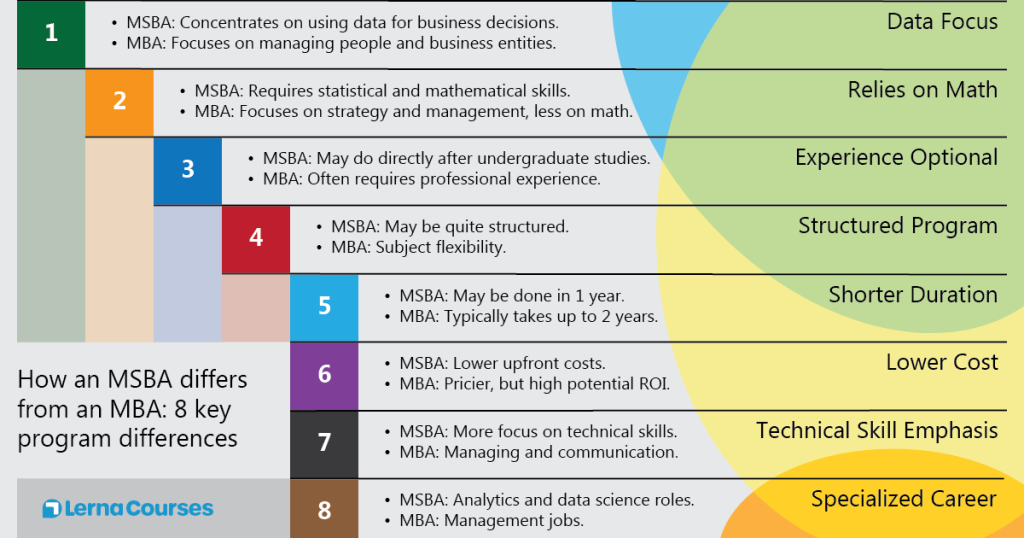There’s a big difference between an MSBA and an MBA in terms of education and careers. A Master of Science in Business Analytics is a technical specialist degree. The Master of Business Administration is for aspiring managers and leaders.
The degrees can lead to lucrative and rewarding careers in different fields. They also differ in structure, cost, skills required, and even entry requirements. Let’s explore these programs to see which might be the right one for you.
MSBA vs MBA

MS in Business Analytics and MBA degrees are similar due to their mutual focus on sound business decisions and corporate value. But there are key differences. Let’s break them down.
1. Data focus
- MSBA: Concentrates on using data for business decisions.
- MBA: Focuses on managing people and business entities.
2. Relies on math
- MSBA: Requires statistical and mathematical skills.
- MBA: Focuses on strategy and management, less on math.
3. Experience optional
- MSBA: May do directly after undergraduate studies.
- MBA: Often requires professional experience.
4. Structured program
- MSBA: May be quite structured.
- MBA: Subject flexibility.
5. Shorter duration
- MSBA: May be done in 1 year.
- MBA: Typically takes up to 2 years.
6. Lower cost
- MSBA: Lower upfront costs.
- MBA: Pricier, but high potential ROI.
7. Technical skill emphasis
- MSBA: More focus on technical skills.
- MBA: Managing and communication.
8. Specialized career
- MSBA: Analytics and data science roles.
- MBA: Management jobs.
Different Career Paths

While business analysts help create corporate value through data, MBA holders are more likely to use data insights to make decisions. Business analytics graduates may compete for entry or mid-level roles before going on to hold more responsibilities. Meanwhile, MBA candidates frequently occupy a leadership position or want to start their track into management.
1. Business analysts solve problems using data
An MS in Business Analytics is for people who love to work with data. The course provides advanced instruction about data wrangling and analysis. Candidates learn the job of a business analyst, which is to collect, clean, and analyse data to derive insights that power corporate success.
Data can help organisations solve their most complex problems – from determining the root of complicated supply chain issues to designing the perfect buyer experience. Big data and business analytics is a massive opportunity, which explains the demand for analytics professionals who can help unlock that value.
2. MBA degree holders aspire to lead and manage
The Master of Business Administration is an advanced degree for professionals seeking a management or leadership position. MBAs develop well-rounded business executives with the skills to maintain competitive organisations. Candidates receive advanced learning in finance, accounting, economics, management, leadership, and operations.
Most MBA programs today cover business analytics as a subject, but on a relatively cursory level. The focus is on interpreting analytics rather than producing them. Even an MBA with a business analytics specialisation won’t prepare you to be a professional business analyst.
Related: What You Can Do With an MBA in Business Analytics
3. Business analytics relies on mathematics
Business analytics professionals excel at recognizing and extracting valuable information from data. While they usually work with structured or clean data sets, they can also sanitise unwieldy information dumps using computer programming and linear algebra.
MS in Business Analytics candidates often come from business or technology backgrounds. With their data-crunching work, they also need strong statistical and mathematical competence. They may hold bachelor degrees in information technology, business, statistics, or a related field. Work experience is not a core requirement for entry.
Related: Is a Masters in Business Analytics Difficult?
4. MBA programs are for experienced professionals
MBA business schools typically look for candidates with at least two years of work experience, sometimes significantly more, ideally in supervisory and management postions.
MBA candidates will often demonstrate a track record of leadership at the team level. They should show promise as communicators, with strong interpersonal skills. Unlike the MSBA, MBA degrees do not require a background in any specialty.
Related: What Is an MBA?
5. Career prospects for both degrees are good
Career prospects for MSBA and MBA graduates are promising.
An MSBA provides sought-after skills in big data analytics, artificial intelligence, and cloud computing. The BLS highlights operations research analysts as one of the fastest-growing professions, with a 23% increase from 2022 to 2032.
Job examples in business analytics include operations research analyst, financial risk analyst, and business analyst, among others.
MBAs open doors to leadership roles. The US Department of Education notes that business is the most popular graduate degree. It offers flexible career options, qualifying graduates for any leadership or management position.
6. Some MBAs are longer and costlier
MBAs are known for being costly, but they offer significant value academically and personally. There are more affordable options, like accelerated online MBAs that can be done part-time over two years, with costs varying by school prestige and features.
MSBA programs are generally less expensive than many MBAs, though top schools may still be costly. They usually last between 10 and 12 months, but for those without a background in business or technology, the duration can extend to two years, covering up to 16 subjects.
Related: Why Should My Company Pay for My MBA?
Bottom line
Ultimately, candidates or professionals who want to learn modern business techniques and strategies will benefit from an MBA. But if you’re fascinated with how businesses leverage data to make intelligent decisions, an MS in Business Analytics could be ideal for you.


Leave a Reply